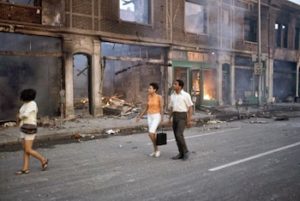
On this date in 1967, the Detroit rebellion occurred. The uprising began near 12th Street and Clairmount in a predominantly Black, overcrowded, low-income neighborhood.
Early on July 23, 1967, Detroit police raided a blind pig (a speak-easy), illegally selling alcohol after hours. A crowd gathered as those arrested were put in a police wagon; unrest erupted and quickly spread. Detroit Mayor Jerome P. Cavanagh asked Governor George Romney to send in the State Police. Cavanagh later authorized Romney to call in the National Guard.
It took 17,000 army forces, the Michigan National Guard, and Detroit police two days to subdue the rebellion. The effects of the unrest were enormous: 43 people died, 1,700 stores were looted, 7,231 people were arrested, 1,383 buildings were burned, and property valued at about $50 million was damaged.
President Lyndon Johnson set up the National Advisory Commission on Civil Disorders, known as the Kerner Report, to investigate the causes of civil disorder in American cities. The commission concluded that; “The riots stemmed from the persistence of racial discrimination and a historical legacy of disadvantages.” One factor underlapped all other social and economic problems: Segregation. One of the most quoted statements from the report was that the United States is "moving towards two societies, one black, one white, separate and unequal."
The Detroit rebellion symbolized black despair and left Detroit’s liberal political coalition in shambles. The summer of that year was a turbulent time in American history, “the worst year for riots in the United States,” with 165 uprisings. The city has fought back to reclaim its major city status just as it did after the race unrest of 1943 that left 34 dead.